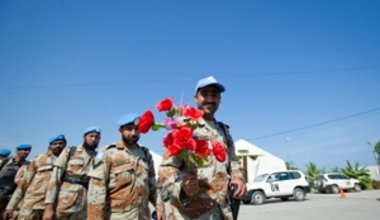TIMOR-LESTE: The slow death of domestic violence
Dili/ Suai, 21 September 2010 (IRIN) - The government of Timor-Leste is struggling to implement a recently adopted law criminalizing domestic violence, amid scepticism that it is too much, too soon.
"We are a teenager of a country," Maria Filomena Babo Martins, chief of training and education at the Secretariat of State for the Promotion of Equality (SEPI), which is coordinating the law's implementation, told IRIN.
Colonized by the Portuguese for almost three centuries, then occupied by Indonesia for 24 years, Timor-Leste gained statehood in 2002 after two years of UN administration following a violent struggle for independence that displaced tens of thousands.
Widespread rape and sexual assault of women and children went largely unpunished during the military occupation, and reinforced a culture where men hold power, according to a 2009 study backed by the UN Development Fund for Women.
Timing
The new law, drafted with UN Population Fund (UNFPA) support, was stalled for a decade as it made "no sense to pass a law when the country had no penal code, which was only approved in 2009", said Martins.
Early resistance to the law has come from people who worry it will break up families, said Maria Barreto, advocacy coordinator with the local NGO East Timor Women's Communication Forum (FOKUPERS).
But Martins said the opening lines of the law make clear its goal is to strengthen families. "This is not [fast-tracking] divorces. Couples will still need to go through the currently required mediation for divorce by working with community and religious leaders.
"People are saying this is too early, that this law is not a reflection of the will of the Timorese people and was imposed by outsiders, but people who say this do not know the statistics on domestic violence here," said Martins.
Reported crimes
Eight out of 10 crimes reported nationwide in 2009 to the vulnerable person's unit (VPU), an investigating department created in 2001 by the UN and national police to respond to crimes against women and children, were for domestic violence. In 2008 it was also the most reported crime – 406 out of 628 cases. While there are signs in 2010 in some districts that cases are down – in the southern Covalima district bordering Indonesia, there have been five reported cases this year versus 22 in 2009 and 24 in 2008 – only a fraction of such crimes are reported, according to Covalima's VPU chief, Amelia Amaral.
"We bring every case made known to us to the court, but many victims are too scared to provide information," she said.
Reimbursing transport costs has encouraged some from rural areas to travel potholed rickety roads to the VPU in the district's capital, Suai, but an "unknown number bear their pain in silence", said Amaral.
To date, nobody has been locked up for domestic violence – defined by the new law as any sexual, physical, psychological, or economic violence against a family member – according to the chief of the country's largest prison, Agapito Kanto.
The law has changed little for Graciela* who has lived in an abused women's shelter in the capital, Dili, for the past six months.
"I am safe here, but I have lost my freedom. But if I stayed at home, I would not be safe and so I am waiting for my case to go through the court from here," she told IRIN. "I wanted to leave earlier, but who would support me and the children?"
The day she fled, she said her husband beat her while she was still naked from the shower.
Next steps
As a first step in publicizing the law, the government is translating it from Portuguese, the working language of the government, to Tetun, the local language.
A recently formed government committee will reach out to ministerial officials, civil society and public workers key to enforcing the law – including health personnel, police, judges and shelter workers. Martins said the agency would launch a campaign to reach the general population in 2011.
While UNFPA supports SEPI's education and training activities on sexual and gender-based violence, the government would have to pay for any additional safe shelters, legal aid and prisons needed. That cost is still unknown, said Martins.
Source (IRIN) : http://www.irinnews.org/Report.aspx?ReportID=90535
***************
 UN
UN United Nations Peacekeeping
United Nations Peacekeeping




